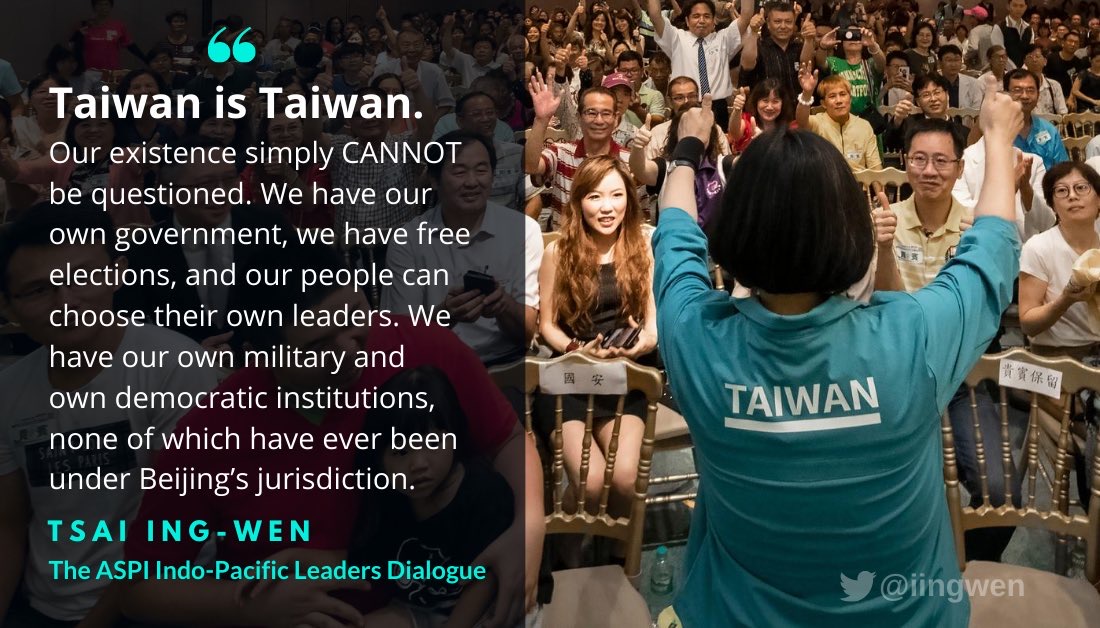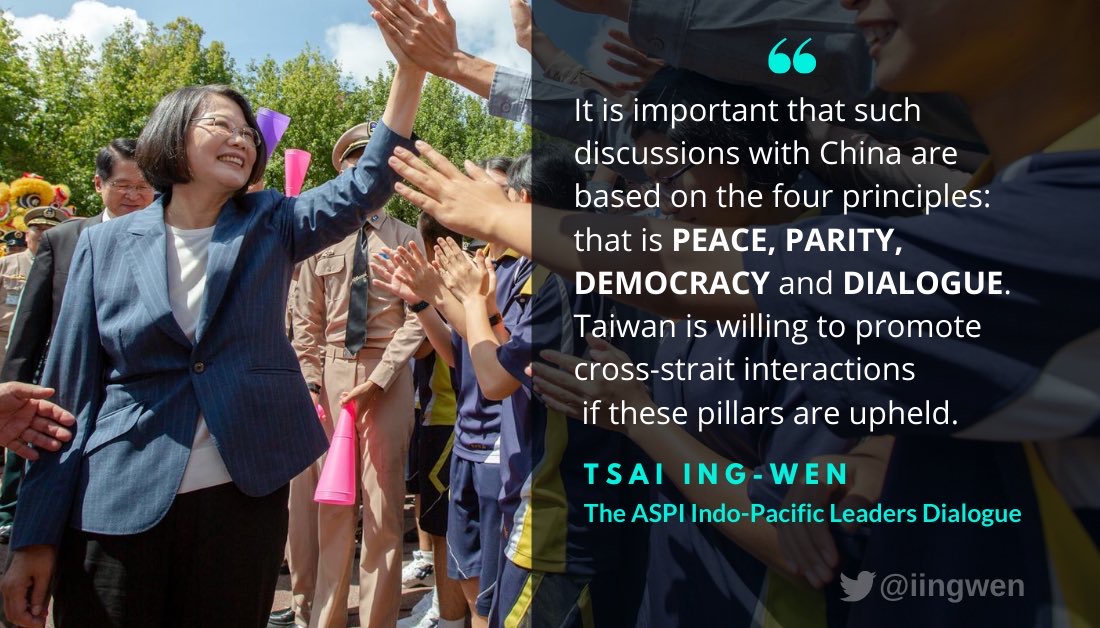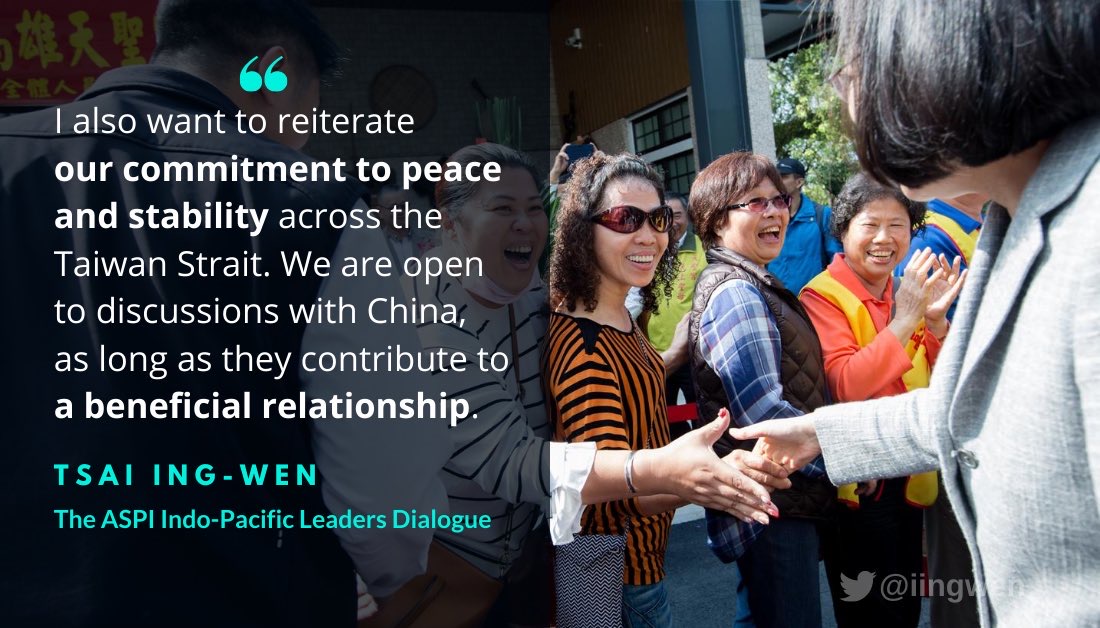President Tsai Ing-wen recently delivered a virtual address at the Indo-Pacific Leaders Dialogue session at the invitation of the Australian Strategic Policy Institute (ASPI), a think tank based in Canberra.
President Tsai also responded to written questions submitted by ASPI.
Q: Is Taiwan pursuing independence? Is reunification possible?
A: Taiwan is Taiwan. Our existence simply cannot be questioned. We have our own government, we have free elections, and our people can choose their own leaders. We have our own military and own democratic institutions, none of which have ever been under Beijing's jurisdiction.
I also want to emphasize that the future of Taiwan is to be decided by the people of Taiwan. This is what we have been insisting.
I also want to reiterate our commitment to peace and stability across the Taiwan Strait. We are open to discussions with China, as long as they contribute to a beneficial relationship. And it is important that such discussions are based on the four principles: that is peace, parity, democracy and dialogue. Peace means we will seek peace with Beijing without the use of force to settle our differences. Parity refers to both sides not denying each other's existence. Democracy means Beijing must recognize that as a democracy, Taiwan's future will be decided by our own people. And dialogue means we will not refrain from discussions with Beijing that are not based on political preconditions. Taiwan is willing to promote cross-strait interactions if these pillars are upheld.
Q: What are the risks of conflict and what would Taiwan expect of Australia?
A: The risks of conflict require careful management by all the parties concerned. We expect and hope that Beijing will continue to exercise restraint, consistent with their obligations as a major regional power. Furthermore, the international community has closely followed the situation in Hong Kong, as well as China's militarization of the South China Sea. As a result, there is now greater scrutiny over the situation in the Taiwan Strait.
There continue to be significant concerns over the potential for accidents, given increased military activity in the region. Therefore, we believe it would be important for all parties to maintain open lines of communications to prevent misinterpretations or miscalculations.
In terms of our interactions with Australia, we are grateful for Australia's advocacy for Taiwan's international space, including participation in the World Health Assembly. As the current pandemic exemplifies, it is important for all countries to be fully represented on the international stage, especially when it comes to health and public safety. We believe Taiwan being engaged internationally, and having a voice at these international organizations, is important to people all over the world.
We hope that Australia also continues to recognize the importance of Taiwan's security in terms of the broader Indo-Pacific region. After Hong Kong, Taiwan stands increasingly on the front lines of freedom and democracy. We certainly hope that like-minded countries will continue to work together to ensure Taiwan's security, which is in the interests of peace and stability in the region.
Q: How does Taiwan prepare itself for this more volatile and dangerous period?
A: Three components are absolutely essential to ensure that Taiwan is adequately prepared. The first is our commitment to ensuring that we continue to take a pragmatic and consistent approach to our cross-strait policy. As I said during my inauguration speech, I will continue to uphold four principles in terms of cross-strait relations. That is peace, parity, democracy, and dialogue.
This means that the international community can continue to expect that my overall commitment to cross-strait peace and stability will remain consistent into my second term.
Another issue of importance is to strengthen our defense capabilities. We do this because we know that in terms of our current situation, strength can be correlated with deterrence. It also reduces the risk of military adventurism. To this end, my government has made quite serious commitments to increasing our defense budget, updating our defense strategies, including the Overall Defense Concept, and ensuring that our men and women in uniform are better equipped and trained.
The third component is to strengthen our linkages with like-minded countries. This is a situation that requires collective efforts, as well as recognition that Taiwan is on the front lines of democracy in the world. We will continue to seek a stronger security partnership with the United States and other like-minded countries in the region, built on our shared values and common interests.
Q: How has Covid impacted Taiwan strategically?
A: We are focused on COVID-19's economic implications, especially in terms of global supply chain restructuring. The pandemic has highlighted the risks of current supply chains in delivering essential medical supplies and PPE. As a result, free market economies around the world are looking much closely into global trade flows, supply chain security, as well as the need to 'reshore' or reestablish certain strategic industries.
In Taiwan, we were able to quickly mobilize our PPE industries in response to COVID-19, increasing the daily production of face masks from 1 million to 20 million. In the future, the government will provide greater support to keep several strategic industries onshore, in order to ensure the steady supply of critical supplies. Sectors we are looking closely at include PPE, medical supplies, energy, and food. We believe it is important for countries to attain a certain level of self-sufficiency in critical sectors, in the current international climate.
Given the crucial link many of our companies play in the global supply chain, we are also closely watching changes in the international economy. COVID-19 has accelerated the trade tension between China and the United States. We want to ensure that our companies are well prepared to navigate the current trade environment, especially as they consider potential shifts either in terms of manufacturing locations or markets.
ASPI is an important think tank focusing on Australian foreign affairs and regional security issues, and is influential in and representative of Australian policy circles. The virtual event was broadcast live at 3 p.m. on August 27 ACT (1 p.m. Taipei time) on the ASPI website. Also attending the event were Taiwan's Institute for National Defense and Security Research Chief Executive Officer Lin Chen-wei (林成蔚), ASPI Executive Director Peter Jennings, Analyst Samantha Hoffman, and Dr. Mark Harrison (Senior Lecturer, Politics and International Relations, School of Social Sciences, University of Tasmania, Australia). The participants held discussions on President Tsai's speech, her responses to questions, Taiwan-Australia relations, and the regional situation.
Video link: https://www.aspi.org.au/event/indo-pacific-leaders-dialogue-taiwan



